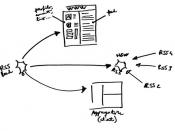Introduction
Blogs, or weblogs, are web dairies which let users simply post information of any type, with each post categorised by topic, e-mail and displayed in reverse chronological order, from the latest to the newest ones. Blogs usually allow readers to leave comments on individual posts, encouraging conversation between blogger and reader. This study examines how organisation experience blogs.(wikipedia, 2006)
What do blogs have to do with business? Blogs can be productivity enhancers for companies large and small. The blog is a central repository, presumably on the company's intranet, rather than the Internet, to preserve confidentiality. Unlike traditional intranet pages, the blog is open to all team members, who can easily search it to locate diverse information, such as a deadline or a marketing request. Progress reports can be posted from anywhere where there is an Internet connection. Workgroup blogs are those in which employees of specific departments, such as Human Resources, can easily share information (Schachter, 2003).
Blogs are being increasingly used in business instead of large, unwieldy content or knowledge management systems, to enable business processes and engender communication, but few examples of real-world usage have been made available to executives interested in assessing the suitability of blogs for their own projects.
Blogs are having an increasingly strong influence on organisations, changing the way the world of business lets customers reveal, expresses and communicate their thoughts, beliefs, and opinions on a wide range of subjects, without necessarily identifying themselves (Miles).
In every mass medium, there is a contract between the writer and the reader. As long as the writer agrees to deliver the truth, the reader keeps consuming the product. In the case of blogs, consumers and media companies are apparently still vetting the development of this indirect 'negotiation' between producers and consumers (Russell, 2006).
In order to...


